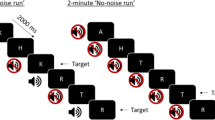Summary
The cardiovascular reactions to mental tasks may reflect the way in which the subject copes with the demands of the task. Different methods of information processing are described. These include controlled processing, in which task performance is effortful and attention demanding. Tasks also become effortful if they have to be performed under stressful conditions (noise, loss of sleep, prolonged work etc). The cardiovascular measures that are sensitive to mental effort and to different forms of information processing are described, together with methodological problems that have to be taken into account. The usefulness of this approach in applied field settings is also outlined.
Access this chapter
Tax calculation will be finalised at checkout
Purchases are for personal use only
Preview
Unable to display preview. Download preview PDF.
Similar content being viewed by others
References
Akselrod S, Gordno D, Ubel FA, Shannon DC, Cohen RJ (1981) Power spectrum analysis of heart rate fluctuation: a qualitative probe of beat-to-beat cardiovascular control. Science 213: 213–220
Bunnell DE (1985) Noninvasive measurement of sympathetic influences on the heart. In: Orlebeke JF, Mulder G, van Doornen LJP (eds) The Psychophysiology of Cardiovascular Control. Plenum Press, New York, p221
Conway J, Boon N, Vann Jones J, Sleight P (1983) Involvement of the baroreceptor reflexes in the changes in blood pressure with sleep and mental arousal. Hypertension 5: 746–748
De Boer RW, Karemaker JM, Strackee J (1983) Beat-to-beat variability of heart interval and blood pressure. Automedica 4: 217–272
Forsman L, Lindblad LE (1983) Effects of mental stress on baroreceptor-mediated changes in blood pressure and heart rate and on plasma catheolamines and subjective responses in healthy men and women. Psychosom Med 45: 435–445
Glass DC (1977) Behavior Patterns, Stress and Coronary Disease. Lawrence Erlbaum Ass, Hillsdale New Jersey
Hockey GRJ, Hamilton P (1983) The cognitive patterning of stress states. In: Hockey GRJ (ed) Stress and Fatigue in Human Performance. Wiley, New York, p331
Hockey GRJ (19 84) Varieties of attentional state: the effects of the environment. In: Parasuraman R, Davies DR (eds) Varieties of Attention. Academic Press, London, p449
Hyndman BW, Kitney RI, Sayers BMcA (1971) Spontaneous oscillations in physiological control systems. Nature 233: 339–341
Kareev Y (1982) Minitypologies from within-subjects designs: uncovering systematic individual differences in experiments. J Verb Learng Verb Behav 21: 363–382
Karemaker JM (1985) Short-term regulation of blood pressure and the baroreflex. In: Orlebeke JF, Mulder G, van Doornen LJP (eds) The Psychophysiology of Cardiovascular Control. Plenum Press, New York, p55
Kitney RI, Rompelman O (1980) The Study of Heart Rate Variability. Clarendon Press, Oxford
Lamberts WM, Visser KR, Zijlstra WG (1985) Impedance cardiography and its usefulness in psychophysiology. In: Orlebeke JF, Mulder G and van Doornen LJP (eds) The Psychophysiology of Cardiovascular Control. Plenum Press, New York, p207
Mulder G (1980) The heart of mental effort. PhD thesis, University of Groningen
Mulder G, Mulder LJM (1981) Task-related cardiovascular stress. In: Long J, Baddeley AD (eds) Attention and Performance IX. Lawrence Erlbaum Ass, Hillsdale New Jersey, p591
Mulder LJM (1985) Model-based measures of cardiovascular variability in the time and frequency domain. In: Orlebeke JF, Mulder G, van Doornen LJP (eds) The Psychophysiology of Cardiovascular Control. Plenum Press, New York, p333
Mulders HPG, Meyman TF, O’Hanlon JF, Mulder G (1982) Differential psychophysiological reactivity of city bus drivers. Ergonomics 25: 1003–1011
Obrist PA, Howard JL, Lawler DE, Galosy RA, Meyers KA, Gaebelin CJ (1974) The cardiac-somatic interaction. In: Obrist PA, Black AH, Brener J, Dicara LV (eds) Cardiovascular Psychophysiology. Aldine, Chicago, p136
Sanders AF (1983) Towards a model of stress and human performance. Acta Psychologica 53: 61–69
Schneider W, Dumais S, Shiffrin RM (1984) Automatic and control processing and attention. In: Parasuraman R, Davies DR (eds) Varieties of Attention. Academic Press, London, p1
Sleight P (1983) The influence of arterial baroreceptors in man on the variability of blood pressure and plasma catecholamines in man. Chest 83: 320–322
Steptoe A (1981) Psychological Factors in Cardiovascular Disorders. Academic Press, London
Steptoe A (1985) Behavioral influences on the mechanisms of hemodynamic regulation. In: Orlebeke JF, Mulder G, van Doornen LJP (eds) The Psychophysiology of Cardiovascular Control. Plenum Press, New York, p169
Veldman JBP, Mulder LJM, Mulder G, van der Heide D (1985) Short-term coherence between blood pressure and heart rate during mental loading: an exploration in the time and frequency domain. In: Orlebeke JF, Mulder G, van Doornen LJP (eds) The Psychophysiology of Cardiovascular Control. Plenum Press, New York, p391
Wesseling KH, De Wit B, Settels JJ, Klawer WH, Arntzenius AC (1982) On the indirect registration of finger blood pressure after Penaz. Funkt Biol Med 1: 245–250
Wesseling KH, Settels JJ (1985) Baromodulation explains short-term blood pressure variability. In: Orlebeke JF, Mulder G, van Doornen LJP (eds) The Psychophysiology of Cardiovascular Control. Plenum Press, New York, p69
Yelich MR, Euler DE, Wehrmacher WH, Sinha SN, Randall WC (1978) Parasympathetic influence on atrial vulnerability in the puppy. Am J Physiol 235: H683–H689
Author information
Authors and Affiliations
Editor information
Editors and Affiliations
Rights and permissions
Copyright information
© 1985 Springer-Verlag Berlin Heidelberg
About this chapter
Cite this chapter
Mulder, G., Mulder, L.J.M., Veldman, J.B.P. (1985). Mental Tasks as Stressors. In: Steptoe, A., Rüddel, H., Neus, H. (eds) Clinical and Methodological Issues in Cardiovascular Psychophysiology. Springer, Berlin, Heidelberg. https://doi.org/10.1007/978-3-642-70655-4_4
Download citation
DOI: https://doi.org/10.1007/978-3-642-70655-4_4
Publisher Name: Springer, Berlin, Heidelberg
Print ISBN: 978-3-642-70657-8
Online ISBN: 978-3-642-70655-4
eBook Packages: Springer Book Archive




